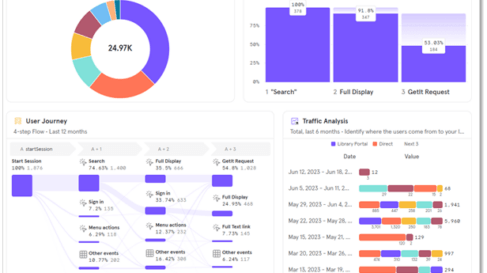Insights from librarians about Academic AI in discovery
From its onset, AI has had a profound impact on discovery, forever changing the traditional search landscape. For libraries, this change brings both challenge and opportunity. A recent Library Journal webinar, How Academic AI is Redefining Discovery, showcased how a pair of forward-thinking institutions are embracing opportunity, and why librarians everywhere should take note.
Featuring insights from Michael Gonzalez of the University of Technology Sydney and Sue Stevens of Cardiff University, the session offered a compelling look at how AI-powered tools like Primo Research Assistant are reshaping the way students and researchers interact with library resources.
Here are the top highlights that make this webinar [here available on demand] a must-watch:
Academic AI: AI with Scholarly Values
The Academic AI pioneered by Clarivate encompasses a suite of tools built specifically for academic environments. Unlike general-purpose AI, these solutions are designed to support scholarly discovery, uphold academic integrity and streamline research workflows. Primo Research Assistant, for example, enables users to ask natural language questions and receive curated, trustworthy academic sources, making research more intuitive and accessible.
Real-World Impact from Leading Libraries
Both Cardiff University and the University of Technology Sydney shared examples of how Primo is advancing their service to users and their institutions. Cardiff’s adoption was driven in part by Primo’s unexpected strength in supporting Welsh language queries — a testament to its multilingual capabilities. Meanwhile, the University of Technology Sydney highlighted how the referencing feature became a “gateway” to AI adoption, helping build trust among faculty and students and encouraging responsible use of AI in academic settings.
Enhancing Discovery and Engagement
The webinar demonstrated how Primo Research Assistant goes beyond search by suggesting related questions, linking directly to full-text resources, and integrating with tools like Rapido for seamless access to ILL materials. These features help libraries personalize the discovery experience and meet the evolving needs of today’s learners.
Libraries as Leaders in Ethical AI Use
Rather than banning AI, both institutions emphasized the importance of teaching students how to use it critically and ethically. Libraries have new opportunities to expand their roles in teaching digital literacy, guiding users through the complexities of AI-generated content and ensuring research remains rigorous and trustworthy.
Community Collaboration Driving Innovation
The session underscored the value of the Ex Libris-user community. Feedback from Cardiff led to the addition of a date filter in Primo Research Assistant. An enhancement that now benefits libraries globally. This kind of collaborative development ensures that tools evolve in step with real-world library needs.
Whether you’re exploring AI in academic libraries for the first time or already implementing it in your library, this webinar available on demand here offers practical insights and inspiration. Don’t miss the chance to learn how your peers are navigating the future of academic discovery and watch it now or bookmark it for later.










